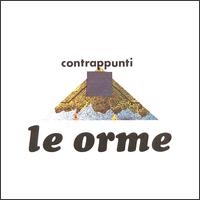 In trying
to fathom the Trident mystique I came to the conclusion that the surest
bet for classic status among this short-lived progressive label’s
handful of recordings is the one that it refused to release! The catalog
number TRI 1003 was assigned to the album Uomini umili popoli liberi,
recorded by Eneide late in 1972, but it was many years before the public
got to hear the music. Ironically, therefore, it would remain the only
Trident album never to undergo forgery. One has the impression that some
high-up executive, listening over-closely at the last minute, thought
he detected a fatal flaw that could not be rectified by further production,
and so the printing and pressing was called off, only just in time before
it became too late. Little did he know that the entire label was in trouble,
compared to which his artistic criteria weren’t worth a brass razoo.
Let’s face it, this is as nice and unassuming a piece of Italian
progressive rock as you are likely to find. It’s the classic line-up
of flute, guitar, keyboard, bass, drums. And if the music is relaxed and
unambitious, the production is actually very good. Despite what that executive
must have thought, there is nothing incomplete about this record.
In trying
to fathom the Trident mystique I came to the conclusion that the surest
bet for classic status among this short-lived progressive label’s
handful of recordings is the one that it refused to release! The catalog
number TRI 1003 was assigned to the album Uomini umili popoli liberi,
recorded by Eneide late in 1972, but it was many years before the public
got to hear the music. Ironically, therefore, it would remain the only
Trident album never to undergo forgery. One has the impression that some
high-up executive, listening over-closely at the last minute, thought
he detected a fatal flaw that could not be rectified by further production,
and so the printing and pressing was called off, only just in time before
it became too late. Little did he know that the entire label was in trouble,
compared to which his artistic criteria weren’t worth a brass razoo.
Let’s face it, this is as nice and unassuming a piece of Italian
progressive rock as you are likely to find. It’s the classic line-up
of flute, guitar, keyboard, bass, drums. And if the music is relaxed and
unambitious, the production is actually very good. Despite what that executive
must have thought, there is nothing incomplete about this record.
 Of those actually
released by Trident, the closest to a classic is probably the first album
by Opus Avantra – where the word avantra is constructed from
avantgarde and traditional. Introspezione is the
name of the album, and it came out in 1974. Donella Del Monaco, the singer,
niece of the famous operatic tenor Mario, also wrote the lyrics. Strangely,
it is not actually her you can see on the front cover at right. The CD
track listing apparently differs from the original LP, and to my mind
this is a clear reason for denying classic status – the legendary
Biglietto Per L’Inferno album is disqualified in a similar manner,
since it is said to show two or more minutes of cuts on the CD. Most of
Opus Avantra’s tunes have singing, or speaking, or mumbling, usually
in Italian, sometimes in French. Is this progressive rock? You would probably
want to classify it more as contemporary music, art songs perhaps, with
some avantgarde sections, a string quartet fairly prevalent, and sometimes
‘retro’ tunes that hark back to baroque opera. But what about
when the drums and bass enter, and the flute starts to wind improvisations
around the vocal line? That’s definitely Itaprog, only one cannot
be sure of the classic status.
Of those actually
released by Trident, the closest to a classic is probably the first album
by Opus Avantra – where the word avantra is constructed from
avantgarde and traditional. Introspezione is the
name of the album, and it came out in 1974. Donella Del Monaco, the singer,
niece of the famous operatic tenor Mario, also wrote the lyrics. Strangely,
it is not actually her you can see on the front cover at right. The CD
track listing apparently differs from the original LP, and to my mind
this is a clear reason for denying classic status – the legendary
Biglietto Per L’Inferno album is disqualified in a similar manner,
since it is said to show two or more minutes of cuts on the CD. Most of
Opus Avantra’s tunes have singing, or speaking, or mumbling, usually
in Italian, sometimes in French. Is this progressive rock? You would probably
want to classify it more as contemporary music, art songs perhaps, with
some avantgarde sections, a string quartet fairly prevalent, and sometimes
‘retro’ tunes that hark back to baroque opera. But what about
when the drums and bass enter, and the flute starts to wind improvisations
around the vocal line? That’s definitely Itaprog, only one cannot
be sure of the classic status.
 With Frutti
Per Kagua by Capitolo 6 we have an album actually recorded in 1971,
then released in 1972. You can certainly call this progressive rock. The
compositions are not necessarily elaborate or refined, but they all have
a structural complexity that one ultimately associates with conveyance
of the music’s message on the one hand, and with the presentation
of group and individual musical skills on the other. It is hard to say
what the message of the music really is, but on the surface it has something
to do with the Native Americans and the telling of their legends. One
has the impression that it is somehow a far-sighted work. After several
listens it is also possible to appreciate it as genuinely fine music and
look with a favorable eye on possibly reserving a place for it on the
Itaprog Parnassus. Only one would have to shrink then from consideration
of what the first Itaprog record might be: this one certainly doesn’t
enter into that debate. Nice singing, nice playing, early enough in the
movement’s development to sound a little derivative, but perhaps
for that very reason these are some of the better rockers among the one-shots.
With Frutti
Per Kagua by Capitolo 6 we have an album actually recorded in 1971,
then released in 1972. You can certainly call this progressive rock. The
compositions are not necessarily elaborate or refined, but they all have
a structural complexity that one ultimately associates with conveyance
of the music’s message on the one hand, and with the presentation
of group and individual musical skills on the other. It is hard to say
what the message of the music really is, but on the surface it has something
to do with the Native Americans and the telling of their legends. One
has the impression that it is somehow a far-sighted work. After several
listens it is also possible to appreciate it as genuinely fine music and
look with a favorable eye on possibly reserving a place for it on the
Itaprog Parnassus. Only one would have to shrink then from consideration
of what the first Itaprog record might be: this one certainly doesn’t
enter into that debate. Nice singing, nice playing, early enough in the
movement’s development to sound a little derivative, but perhaps
for that very reason these are some of the better rockers among the one-shots.
 Apoteosi
really had an egocentric band name, but they also left a very fine one-shot
eponymous album, which they brought out in 1975, and I certainly doubt
if it resulted in much of an increase in liquidity for the musicians.
In short it’s a dandy. Three of the five – including the girl
singer – were siblings; and in some sense the music has a homespun
atmosphere, but mainly in reference to the startling individuality and
integrity of their compositions. For in general the production and musicianship
are first-rate from start to finish. This is another record that one perhaps
may not wish to listen to so very frequently. To be sure, there is no
need to listen in order to establish the quality of the music: that is
very evident at first acquaintance. Subsequent listens would divulge that
the orientation towards classical music is unusually strong without being
in the slightest way exploitative, the sound is purposely seductive without
being in the least bit dishonest, and a debt to other musicians is not
especially apparent. To my mind this probably should rate as one of the
top ten 70s prog records world-wide. One thing it does not have is popular
appeal, however, so you will want to become a serious student of Itaprog
before looking into it.
Apoteosi
really had an egocentric band name, but they also left a very fine one-shot
eponymous album, which they brought out in 1975, and I certainly doubt
if it resulted in much of an increase in liquidity for the musicians.
In short it’s a dandy. Three of the five – including the girl
singer – were siblings; and in some sense the music has a homespun
atmosphere, but mainly in reference to the startling individuality and
integrity of their compositions. For in general the production and musicianship
are first-rate from start to finish. This is another record that one perhaps
may not wish to listen to so very frequently. To be sure, there is no
need to listen in order to establish the quality of the music: that is
very evident at first acquaintance. Subsequent listens would divulge that
the orientation towards classical music is unusually strong without being
in the slightest way exploitative, the sound is purposely seductive without
being in the least bit dishonest, and a debt to other musicians is not
especially apparent. To my mind this probably should rate as one of the
top ten 70s prog records world-wide. One thing it does not have is popular
appeal, however, so you will want to become a serious student of Itaprog
before looking into it.
 While sensing
a certain obligation, I will resist the temptation to review Le Orme’s
Felona e Sorona of 1973, despite it being one of those famous ‘concept’
albums, with a translated edition, moreover, for an English-language issue
on the Famous Charisma Label, a rare honor for any Italian band. Frankly,
I like Le Orme’s Contrappunti album from 1974 better. It combines
Felona e Sorona’s complex musicality with the earlier Uomo
di Pezza’s biting social commentary in new and triumphant realizations
of the progressive art. Presumably Felona e Sorona is more monumental
in that it attempts to furnish one integrated piece of music from several
episodes. But ultimately that is neither here nor there as far as the
Itaprog sound is concerned, for continuity does not have to be overt.
Typical of Le Orme are occasional set tunes, and don’t get too bored
when these suddenly pop up: usually they talk about things like date-rape
and secret abortions, if you really want to know. The main thing is that
after a while of boredom you’ll find that they begin to kick it up.
The woes of the planet are many, and are ever-present. But at some point
you have to let yourself go and show your spirit. Like most records by
Le Orme, Contrappunti does not omit this important ingredient.
While sensing
a certain obligation, I will resist the temptation to review Le Orme’s
Felona e Sorona of 1973, despite it being one of those famous ‘concept’
albums, with a translated edition, moreover, for an English-language issue
on the Famous Charisma Label, a rare honor for any Italian band. Frankly,
I like Le Orme’s Contrappunti album from 1974 better. It combines
Felona e Sorona’s complex musicality with the earlier Uomo
di Pezza’s biting social commentary in new and triumphant realizations
of the progressive art. Presumably Felona e Sorona is more monumental
in that it attempts to furnish one integrated piece of music from several
episodes. But ultimately that is neither here nor there as far as the
Itaprog sound is concerned, for continuity does not have to be overt.
Typical of Le Orme are occasional set tunes, and don’t get too bored
when these suddenly pop up: usually they talk about things like date-rape
and secret abortions, if you really want to know. The main thing is that
after a while of boredom you’ll find that they begin to kick it up.
The woes of the planet are many, and are ever-present. But at some point
you have to let yourself go and show your spirit. Like most records by
Le Orme, Contrappunti does not omit this important ingredient.